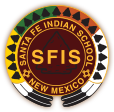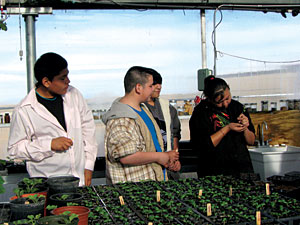Academics
Agriscience
| History | Practice |
History
An extension of the Community Based Education Model, agriscience was originally conceived as the Community Based Agriculture Program (CBAP). The program began with initial funding from NASA in 2001 and has been sustained via funding from various sources. With a small class size, Agriscience provides individualized attention to students that also is rooted in the community based education approach, partnering students, faculty and students with local and Indigenous community connections and field-based experiences.
Framed by cultural and sustainable agricultural history, concepts and practices, the program works closely with several Pueblo communities to engage students in all aspects of farming and agricultural practices through regular community visits. SFIS school gardens and a greenhouse with advanced automated controls and materials, provide students with practical experience growing food and ornamental plants throughout the seasons.
Students learn interdisciplinary concepts that are rigorously based in the fields of chemistry, biology, botany/ethnobotany, horticulture, ecology, math, economics and cultural studies throughout the school year.
| back to top |
Practice
Agriscience is the application of scientific principles to the design and management of sustainable agriculture systems. Agriscience examines the ways in which sustainable agriculture can be integrated into the landscape of the Southwest U.S with an emphasis on traditional farming practices while supporting the fabric of local Pueblos and communities.
Our expectations are that students in agriscience will strengthen scientific skills while learning the ethical, cultural and scientific orientations necessary for building an environmentally viable agriculture production program, particularly in an indigenous community. Students working in conjunction with community partners progressively become aware of the role of agriculture within traditional Pueblo communities, as well as other communities globally, and the implications of food, land and culture in terms of indigenous cultural survival.
Agriscience Goals
- To develop an understanding of the elements and processes which serve as a foundation for sustainable agricultural systems
- To learn the scientific and cultural basis for maintaining viable agriculture on Pueblo land
- To develop the analytical skills necessary for farming in arid regions
- To learn the various methodologies and tools used to carry out agriscience research, demonstration and production projects
- To assist students in realizing the importance of ecologically integrated living patterns, which support sustainable agriculture
Agriscience Objectives
- To develop skills necessary for understanding the foundations of sustainable agriculture
- The value of native crops as they relate to environmental and cultural viability
- To develop an appreciation of human activity and knowledge as they relate interface with nature in an environmentally sound way
- How to utilize appropriate technologies on small farms in Pueblo communities
- How to conduct field research which gathers scientific data in support of traditional farming
- To understand the importance of language, economics, history, and traditional land and water use to Native American agriculture
| back to top |

